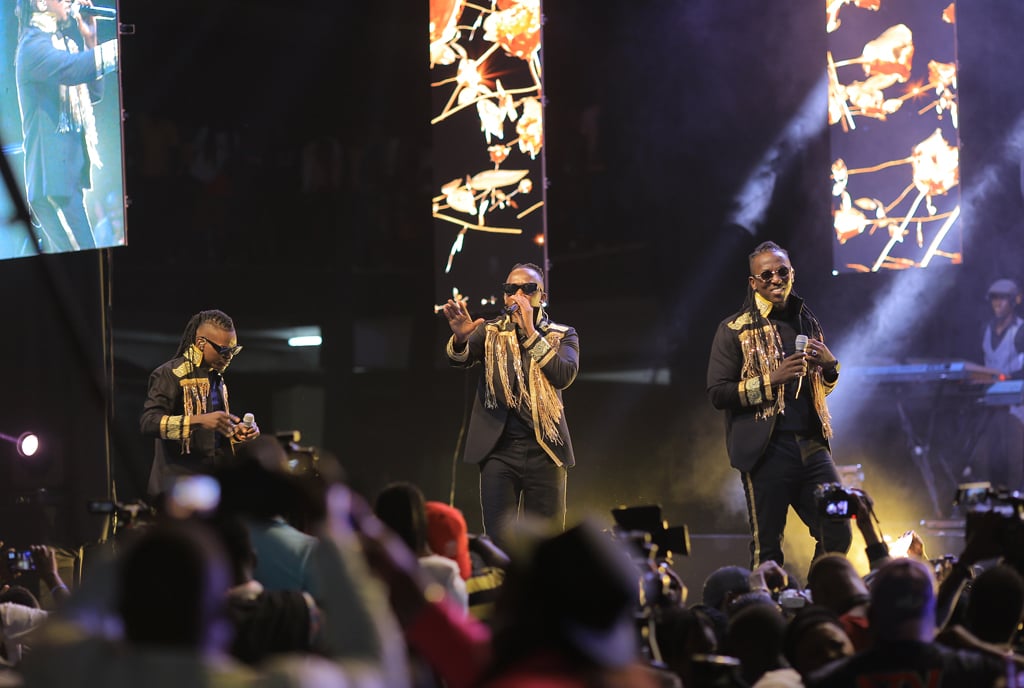Prime
What it takes to stage a local music concert

Kampala Boys, alias B2C, perform at a concert at Freedom City on Entebbe Road in August. Organisers say there are a couple of dynamics involved in organising a music concert. Photo / Gabriel Buule
What you need to know:
- Stakeholders say organising music concerts is not for the faint-hearted because even factors outside one’s control such as weather can either make or break you, Gabriel Buule writes.
The question around the cost of organising a music concert in Uganda has in recent times become pertinent. This follows the spike in music concerts organised in the country following the full reopening of the economy in January after a Covid-19 pandemic-induced lull.
Andrew Jedidiah Ssebaggala, the production manager of Uganda National Cultural Centre (UNCC), can claim to have an answer. UNCC runs a venue that needs no introduction to Ugandan creatives— the National Theatre.
Ssebaggala, who is also involved in booking space at, among others, the National Theatre’s auditorium, says there are a couple of dynamics involved in organising a music concert.
When you choose to stage your concert at the National Theatre’s auditorium, for instance, Ssebaggala says the venue fees will grant you access to changing rooms, the green room and inbuilt resources like the chairs, lights, stage and simple sound.
A producer and an arts group manager, Ssebaggala further explains that to turn in a profit, art —much like any business—requires sound investment and accountability.
Juvenile Unik Mugisha, an event’s organiser and a music manager, who recently held a successful concert for singer Shafik Walukagga, alias Fik Fameica, told Sunday Monitor that—on average—one needs Shs150 million to organise a mega music concert in Kampala.
Mugisha said the money is channelled to production, advertising, security, Kampala Capital City Authority (KCCA), police, National Environment Management Authority (Nema) and venue fees. He further added that—on average—an outdoor venue for a massive concert can cost anywhere between Shs20 million to Shs25 million, depending on days of preparation, size and negotiations.
Deliverables
The venue and production consume a disproportionate part of the money, with an organiser—on average—spending Shs30 million on production at venues such as Lugogo Oval and Freedom City. But before that, there are legal and technical hurdles one must jump to stage a music concert.
Dorothy Nabunjo, an events promoter and talent manager, explains that taking legal precautions is especially of great utility. She also reveals that before tying down a venue, one ought to have Shs100,000 ring-fenced for securing police permission. They also need to be in close contact with the police, who usually run the rule over security at a venue, as well as carry out sweeps using bomb detectors at the Police K9 unit. The area police commander and anti-terrorism police also should be on speed dial.
The size of the venue and expected attendance determine the police bill as per Mugisha. Security for venues such as Lugogo Oval will always triple the fees that someone pays for Sheraton Gardens or an indoor venue. In all, security can cost an organiser Shs5 million.
Elsewhere, KCCA requires the organiser to present a formal letter requesting to hold the event, security arrangement, notification from the police by attaching a police letter, clearance from venue owners, fire control strategy and human traffic flow and control. Other requirements include first aid facilities, toilets with clear demarcation of male and female, waste management, noise management kept at 60 decibels, among others.
An advertising banner placed anywhere in Kampala attracts a daily fee of Shs10,000. Nema also gets anywhere between Shs100,000 and Shs150,000. The taxman also slaps organisers with an 18 percent charge in taxes after the concert.
Delicate balance
Past experiences show that staging a music concert is touch-and-go. Top Boy Entertainment records burnt its records in early November during its inaugural concert. The local events group hoped to make a kill when its so-called Big Show listed a who’s who, including Jamaican artiste Beenie Man, Nigerian Afro-pop star Ikuforiji Olaitan Abdulrahman alias Oxlade, among others.
The show, however, was deemed to have gone south on account of a low turn-up at the venue. To cap things, Oxlade reportedly refused to perform, thanks to unpaid dues.
“Promoters need to learn to do the right thing when booking artistes. You invite an artiste to come and perform at your event, you were given a booking agreement, which you duly signed, then you refuse to honour your own part of the contract and refuse to pay me as at when due,” Oxlade later said in a video posted to Instagram.
In a statement, the organisers revealed that they invested a whopping $300,000 (Shs1.1b) into putting together the concert. Losses were incurred, they added, because of counterfeit tickets, mismanagement and middlemen in the business.
Brave heart
Mugisha says organising music concerts is not for the faint-hearted. A lot rides on ticket sales. Factors outside one’s control such as weather can either make or break you. The stakes are even higher when dealing with international artistes, who don’t entertain voluntary pay cuts or rescheduling performances.
“You have to spend a lot of money on posters, social media influencers, newsprint, television and radio if you are targeting a huge audience,” he advises, adding that the load can be lightened when a deal is made with companies that offer prepaid advertising space in the form of sponsorship.
Recent figures released after the Uganda Bureau of Statistics re-based the economy show that the entertainment industry grew by 30 percent in 2016/2017. This worked to a contribution of about Shs141.5b from the entertainment sub-sector to the economy. Collectively, the services sector, where entertainment belongs, contributes Shs47.1 trillion to Uganda’s economy.




